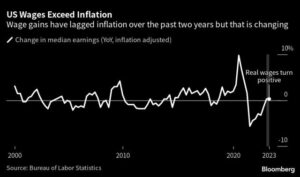-
Median earnings ran above consumer prices in first quarter
-
Strong wage gains may tilt Fed toward another rate hike in May
US workers are starting to see pay gains run faster than inflation, amplifying their purchasing power and giving the Federal Reserve reason to raise interest rates again next month. Median weekly earnings of full-time wage and salary workers were 6.1% higher in the first quarter of 2023 compared to the same period a year earlier, the Bureau of Labor Statistics said in a report Tuesday. Inflation during that time ran at 5.8%, the BLS said.

The data signify that Americans may be finally starting to stretch their dollars further, as wage gains have generally lagged inflation over the past two years. Price pressures have been cooling somewhat, but companies are still raising pay to attract and retain a scarce supply of workers.
While that may bode well for consumer spending, it’s potentially worrisome for the Fed as they try to curb demand across the economy to tame price pressures. That may incline policymakers to lean toward another hike at their May meeting.
Read more: Fed’s Bullard Says Recession Fears Off-Base and Urges More Hikes
However, when looking at wages unadjusted for inflation, the gains are losing steam from one quarter to the next. Earnings rose 2.1% in the third quarter of 2022, followed by 1.3% at the end of the year and 1% to start 2023.
Demographic Breakdown
Pay gains differed among demographic groups. While White, Asian and Hispanic Americans experienced positive real wage growth to start the year, Black Americans’ pay gains lagged inflation. Women’s earnings kept up with rapid price growth, while men’s fell behind.
What’s more, women’s earnings climbed to 84% of men’s, hovering near a record in data back to 1979.
Other data also show compensation is regaining momentum. The Atlanta Fed’s wage growth tracker rose 6.4% in March, the first acceleration in five months. Average hourly earnings, as tracked by the BLS, also ticked up last month.
Another pay metric — the employment cost index, which is a broad gauge of wages and benefits — will also be important for policymakers to evaluate when released next week.
